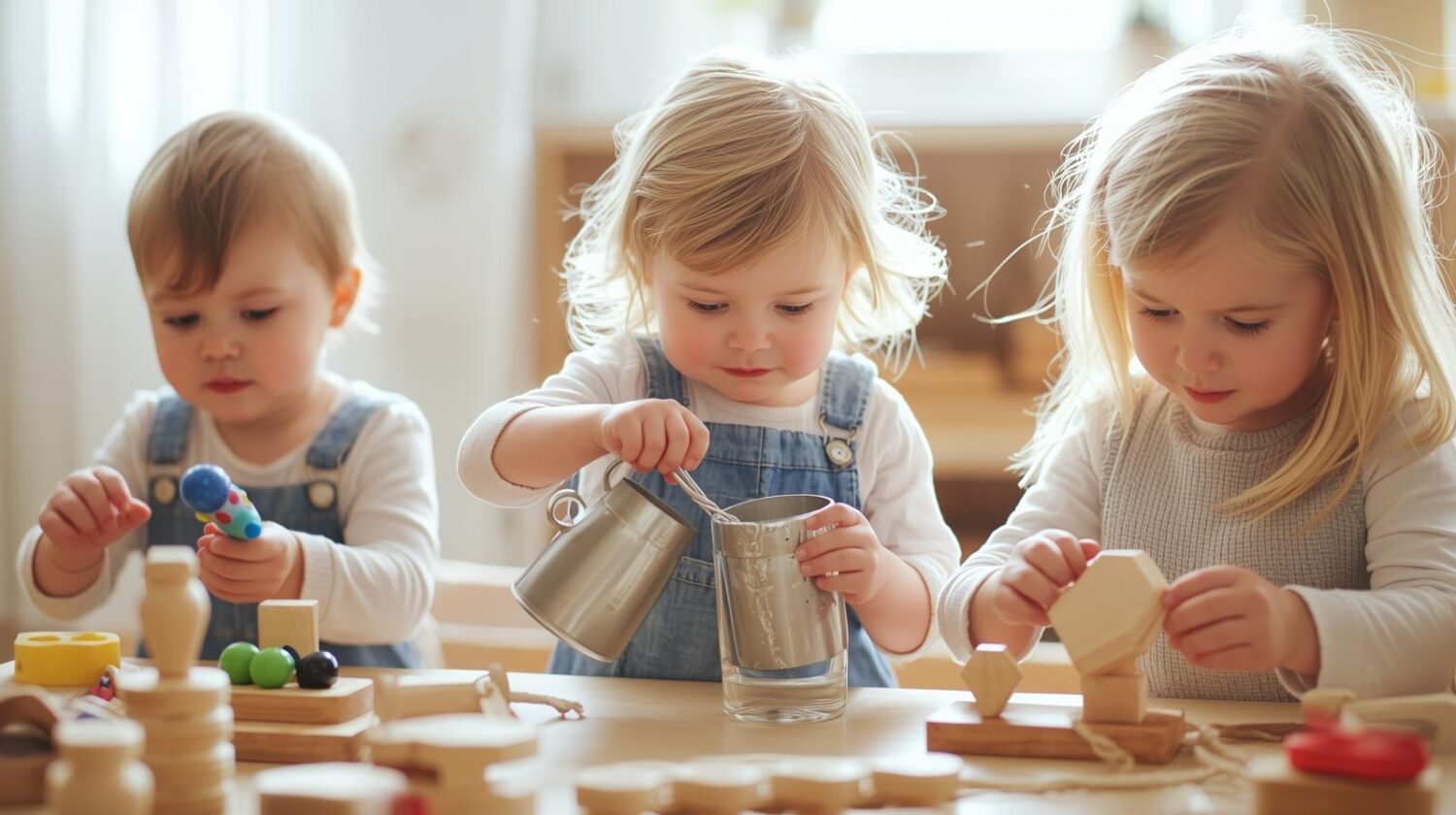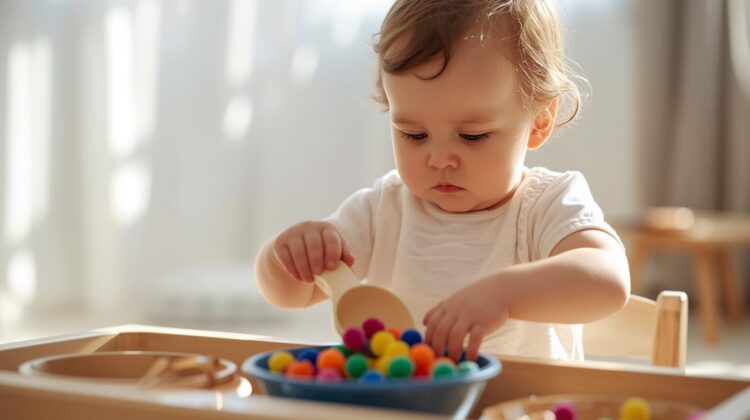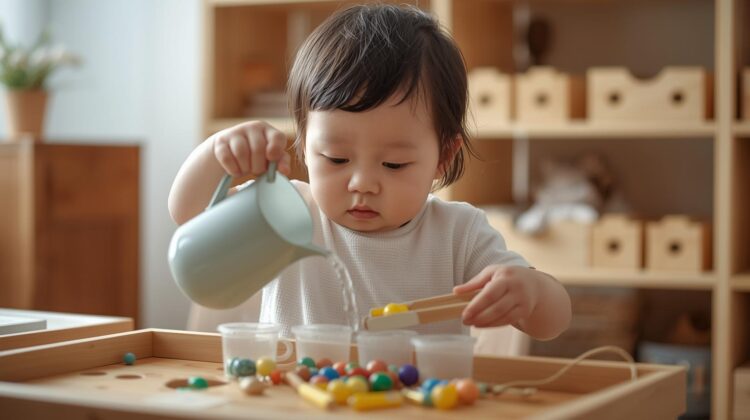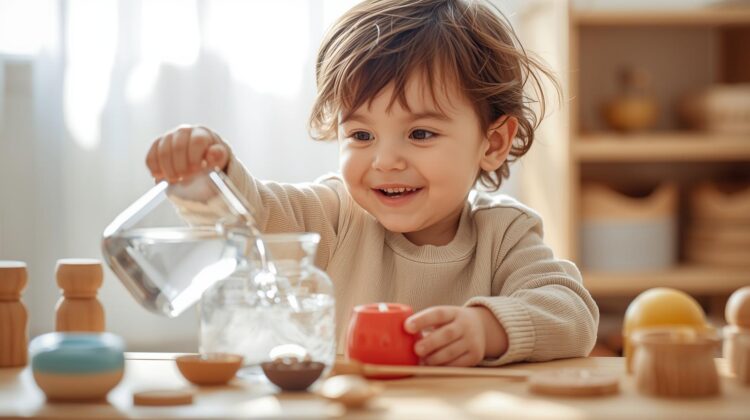Montessori education is not limited to the classroom. At La Prima Casa Montessori, we encourage our parents to adapt the Montessori philosophy at home as well.
In the heart of the Montessori method are practical life activities. These are everyday tasks that help children develop concentration, coordination, confidence, independence, and a sense of order.
From pouring water to folding laundry, these simple tasks create powerful opportunities for growth. And with just a few thoughtful adjustments, your home can become a space where learning and daily living naturally come together.
Here are some easy-to-implement, Montessori-inspired activities, categorized by age group.
Practical Life Activities For Babies
From birth to 18 months, babies absorb the world through their senses and develop fundamental motor skills. Activities for this age should focus on sensory exploration and building hand-eye coordination.
- Treasure Baskets: Fill a small, low-sided basket with safe, everyday objects of varying textures, materials, and weights. Think wooden spoons, large metal keys, a smooth stone, a small brush, or a soft piece of fabric. This allows the baby to explore different sensations and textures.
- Object Permanence Box: This classic Montessori Object Permanence Box can be made with a shoebox. Cut a hole in the top and show your baby how to drop a ball or a small toy through it. The toy disappears, and then gets retrieved, reinforcing the concept that objects exist even when they can’t be seen.
- Simple Scooping and Pouring: Offer two small bowls and a scoop or large spoon. Start with dry ingredients like lentils, large pasta, or dry cereal. Demonstrate how to scoop from one bowl to the other. This refines fine motor skills and builds focus.
Practical Life Activities Toddlers
Between 18 months and 3 years old, toddlers are driven by a need for independence and a desire to mimic adult actions. These activities turn everyday chores into engaging work.
- Washing Windows: Fill a small spray bottle with water and give your child a cloth or a squeegee. Let them spray and wipe a low window, mirror, or tabletop. This provides a satisfying sensory experience while working on gross motor skills.
- Fruit Preparation: Offer your toddler a soft fruit like a banana or clementine. Demonstrate how to peel it slowly, then let them try. For older toddlers, use a butter knife and a soft fruit like a banana to practice cutting and develop a sense of accomplishment.
- Laundry Helper: Involve your child in the laundry routine. They can sort clothes by color, help load the washing machine, or even match pairs of socks from a small basket. These tasks build sequencing skills and a sense of responsibility.
Practical Life Activities For Preschoolers (3 to 6 years)
Preschool children between 3 and 6 years old are ready for more complex tasks that refine their skills and introduce foundational academic concepts.
- Flower Arranging: Provide a small vase, child-safe scissors, a pitcher of water, and a few flowers. Show your child how to trim the stems, pour water into the vase with a funnel, and arrange the flowers. This activity helps develop fine motor skills, visual discrimination, and appreciation for beauty
- “I Spy” and Rhyming Games: Instead of a simple “I spy with my little eye, something blue,” try “I spy something that starts with the ‘t’ sound.” For rhyming, collect small objects or pictures that rhyme (e.g., a cat and a hat) and have your child find the pairs.
- Sink or Float: Gather a variety of household objects—a rock, a leaf, a toy, a cork—and a large tub of water. Before dropping an item in, ask your child to predict whether it will sink or float. This introduces the scientific method in a fun, hands-on way.
- Making a Simple Snack: Involve your child in food preparation. Tasks like spreading jam on toast with a butter knife, making a fruit kebab, or mixing ingredients for a simple recipe teach practical skills, math concepts (measuring), and the joy of preparing their own food.
At La Prima Casa, we believe that by adopting a Montessori mindset, you can see your home and everyday activities as rich learning opportunities. The key to creating great practical life activities is to prepare the environment, model each activity slowly and deliberately, and then step back, allowing your child the time and space to practice and master the skill on their own.



